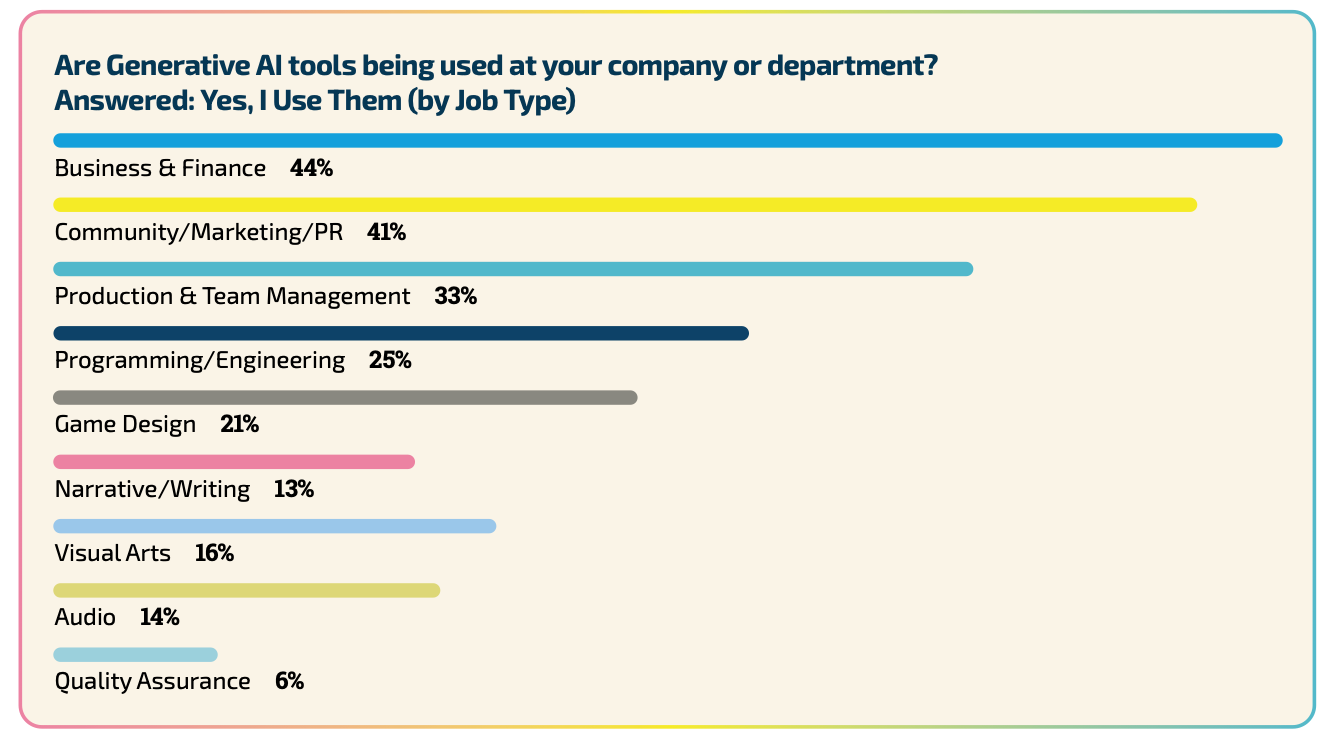GDC & Game Developer: The State of the Gaming Industry in 2024
Layoffs; engine changes; generative AI implementation & more.
Companies surveyed over 3000 employees in the gaming industry.
Platforms and Engines
56% of developers have been working in the gaming industry for less than 10 years. Among those in the industry the longest, the majority are men - 87%.
Currently, 66% of developers are making games for PC, and 57% plan to continue making games for this platform in the future. 33% are working on projects for PlayStation 5, and 30% plan to release games for Xbox Series S|X. Mobile platforms are planned for 23-24%. Only 1% is currently working on games for UGC platforms (Roblox, Fortnite, Minecraft).
The popularity of mobile device development has decreased by 16% compared to 2023. PC and consoles are the most popular platforms.
33% of surveyed developers use Unity; 33% use Unreal Engine; 14% have their engine. In the last 12 months, 7% of companies changed their game engine, 28% plan to do so, and 16% have not yet decided. High numbers are related to Unity's Runtime Fee announcement.
Interest in VR/AR continues to slightly decline. Meta Quest (34%), Steam VR (26%), PlayStation VR2 (15%), Apple visionOS are the most popular platforms for future releases.
Generative AI
31% of developers use generative AI; 18% do not use it but see colleagues using it; 15% are interested but have not applied it yet. Only 23% are not interested.
AI is mostly applied in business and finance (44%), marketing and PR (41%), production and team management (33%). The least is in QA (6%) and audio (14%).
Generative AI is prohibited in 12% of companies, mandatory in 2%, and the rest are undecided.
Attitudes toward AI vary. 21% believe tools based on AI positively impact the industry, 18% negatively, and 57% think the effect is mixed.
84% are concerned to some extent about the ethics of using AI in the gaming industry. The biggest concern is that AI tools will lead to more layoffs.
Blockchain; Monetization Methods
Interest in blockchain games continues to decline. 77% of developers are not interested, a 27% increase compared to 2023. Only 2% of companies use blockchain technologies.
Most developers create premium games (51%), followed by the F2P model (32%).
38% of developers (mostly major ones) have either made or discussed television adaptations of their IP. The majority of the industry (89%) agrees that expanding gaming IP beyond platforms is beneficial.
48% integrate various accessibility tools into their games.
How people are working
The majority of game developers (64%) work 40 hours per week or less.
58% of game companies have decided not to force employees back to the office. Among those who want employees back, AAA companies (40% of them) are the majority.
Layoffs
35% of gaming industry workers have faced layoffs - either themselves, their acquaintances, or colleagues.
56% of those surveyed are concerned about the situation in the industry. Creating unions to protect their rights is seen as one solution.
79% of gaming industry representatives believe that unions are needed in the gaming industry.
5% of respondents are members, and 18% have discussed this issue. There is a direct correlation between the age of respondents and the desire to create unions (more desire among younger respondents).
Demographics
68% of gaming industry workers are aged between 25 and 44.
69% are men, 23% are women, and 5% are non-binary individuals.

























